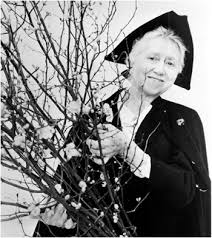
ENGLISH READING CIRCLE ON POETRY AND PROSE POETRY – POEM OF THE MONTH ANALYSIS: “POETRY” BY MARIANNE MOORE
This month’s poem, “Poetry,” by Marianne Moore, is a curious little poem. Moore wrote the first version of this poem in 1924, and then spent nearly five decades revising it, finally settling on a three-line version that she included in her 1967 volume, The Complete Poems of Marianne Moore. (You can read the two versions of the poem in this article by American poet Robert Pinsky). Whereas the original version takes us on a long, descending, and, quite frankly, baffling journey through the realm of everything a poem both should and shouldn’t be, the short version gets right to the point. Indeed, in comparison to the long, expository development of the original version, the three terse lines read as succinctly as series of bullet points. The speaker asserts that:
1) she “too” dislikes poetry;
2) nonetheless, she reads it (albeit with a feeling of “perfect contempt”);
3) through reading it, she discovers in it a place for “the genuine.”
Although this version might be delightfully bite-sized, and its speaker teasingly tight-lipped, it is anything but clear. Why does the speaker dislike poetry – or at least claim that she does? Who is she directing that “too” to? Does she assume that we – her readers – dislike poetry? Why? After all, we’ve sought out her poem (and presumably other poems as well), so we must like poetry, or at least have an interest in it. What kind of affinity is she trying to claim between herself and the reader of her poem? Is this a peculiar instance of reverse psychology, her way to get us to admit that, in fact, we really do like poetry? And what, exactly, does she mean by “the genuine”?
If we turn to the longer version, we’re not likely to find any answers, although Moore appended the original, long version as a footnote to the final, thee-line version, and this prompts us to read the two in tandem with each other. We’ll talk about both poems on Monday, starting with the short version before moving onto the long version that opens up like an accordion-folded map, to see where we’ll end up.
Happy Reading,
Chiara



